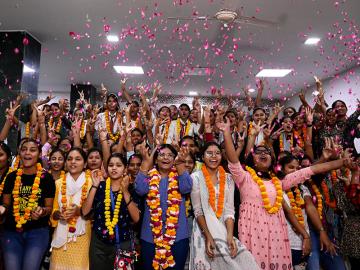Four-day work week: Is India ready for it?
The world's largest trial in the UK has overwhelmingly voted for a shorter work week. But it would require systemic changes for it to be implemented in India
The popular saying “Thank God, it’s Friday”, would once reflect every working professional’s relief about the impending weekend–no meetings, no calls, no deadlines. But, over time, as work overload on weekends became routine, its significance fizzled out.
Is it time to return to it, albeit with a tweak? Can employees now go “Thank god, it’s Thursday”? Turns out, some are already.
Between June and December, the world's largest four-day work week trial, comprising 61 companies and around 2,900 workers, took place in the UK, ending with a whopping 92 percent of the participating companies (56 out of 61) adopting the format. Eighteen among them have confirmed the policy is here for good.
It brought to light many positives such as work-life balance, a reduction in the carbon footprint, benefits related to sleep, stress levels, personal lives and mental health. Employees of some of the participating companies went on to say that “no amount of money” would convince them to go back to working five days a week.
The 4 Day Week Global group is coordinating these pilot programmes as part of its global campaign to encourage more firms to switch from the standard 40-hour workweek to a 32-hour model for the same pay and benefits.
More recently, Christopher Pissarides—a professor at the London School of Economics who specialises in the impact of automation on work—while speaking about the benefits of using AI applications like ChatGPT, said in an interview during a conference in Glasgow: “We could increase our well-being generally from work and we could take off more leisure. We could move to a four-day week easily.”
Previously, countries like the USA, Belgium, New Zealand and Iceland have tried a four-day work week trial, and the general consensus was that people appreciated and were in favour of the concept. A 2019 poll of 36,000 Americans carried out by YouGov America found that two-thirds of respondents preferred a four-day work week regardless of whether that meant longer working hours on those days.
Also read: How to live happier in 2023: Diversify your social circle
Can it work in India?
Many of the governmental and non-governmental companies in India work on a six-day schedule. While many companies in metros and Tier-1 and Tier-2 cities have started with a five-day week, it’s an alien concept in smaller cities and towns. Some companies such as TAC Security, Swiggy, OYO, MullenLowe Lintas Group, and ad agencies like DDB Mudra did attempt a trial run on a four-day work week in the past few years, but the outcome wasn’t promising.Raghav Swamy, associate vice president, brand strategy at Leo Burnett, who has spent more than three years at the advertising agency, feels a four-day week certainly won’t work in the ad industry. “Given the high ration-allocation of brands per person in our agency, it seems difficult.” Swamy further added that in most agency-client relationships, the ball is usually in the client's court and unless the client-side also adheres to the policy, implementing it will be a problem. “If the client sends an email on Friday evening asking for some changes to be done, we usually try to get them done on the same day itself. If we adopt the four-day work week, a bottleneck will be created on Friday. This will spill over on Monday, a dreaded day any which way, when you’re going to feel much more pressure to deliver,” he says. The increased pressure on the working days, he adds, is bad news for an industry already struggling with mental health problems.
The four-day work week isn’t also a plan that can work for all industries, especially those in manufacturing, services, or customer-facing roles.
Ria Rustagi, CEO and co-founder of Pankhtech India Pvt Ltd and the developer of Neuphony, India’s first brain wearable headband, says that, for an entrepreneur, it’s difficult to have work hour limitations. For her, the cons of a four-day work week outweigh the pros. “Just like eating one meal for the whole day can’t work on an everyday basis, I think too much work for four consecutive days would not as well. The overall workload will not reduce and, by the fourth day, employees might not be left with any creative ideas,” says Rustagi.Rij Eappen, COO of WYLD, an early-stage startup which is the maker of India's first social currency payment card, agrees with Rustagi. According to him, in an early-stage startup, agility is required since the amount of work is often high and resources limited. “In such an environment, implementing a four-day work week might slow down the organisation, and impact operational timelines.”
With evolving socio-economic conditions over the past few years, India Inc has witnessed a considerable shift in how work culture is defined. Today, organisations are more mindful of employee growth and offer flexibility in terms of work hours, opening up conversations about work-life balance. But Shamita Ghosh, head–HR, BookMyShow, feels there is still a long way to go in terms of creating the cultural shift that aligns with global norms. In such a scenario, both organisations and employees have to arrive at a shared vision on the best practices. “A standard four-day week in many fields may not work if the work output is scheduled for weekends or hours outside the traditional timings. Instead of standardising it, have flexible hours, incorporate a hybrid format, including a few days of work from home. This will help maintain high levels of efficiency.”
“Currently, in the Indian economy, every industry and company is expecting a growth spurt. Hence, a four-day work week doesn’t seem feasible unless there is acceptance of such a model across the economy, which is unlikely. It needs to be supported by an entire ecosystem change in the way work is delegated and measured, utilisation of workspace, training, banking, etc,” says Princy Goyal, founder & CEO, Wybrid, a tech-first solution company that promotes work-life balance while providing employees with the tools they need to be more productive.
Also read: Flexible working is gaining popularity in businesses, even among managers
What do employees think?
A number of employees, especially those working in advertising agencies, media houses, and marketing firms, isn’t in favour of a four-day work week either. “I am not sure if a four-day work week is best for an ad agency. We're barely able to make it through a five-day work week. On a number of weekends, we have to work without any overtime compensation. If we come to a four-day work week, I am sure we'll still have to work over the weekends, again without any overtime compensation—instead of two days, we'd be doing three days of free work. And that's even worse,” says Kavya Gupta, copywriter at a renowned advertising agency.In the media sector, owing to the high demand of putting out content regularly, a four-day work week doesn’t sit well. Shilpi Chatterjee, who works as a standards & practices associate at a leading broadcasting media company that doesn’t follow a four- or five-day schedule, and instead has shifts for employees, agrees. “I don’t think a four-day work week will be apt for us because this industry is demanding. Sometimes there are days when an episode is going to go on air in the evening, and we get rough cuts in the morning, so somebody has to be available to work on it immediately. Generally, we run very cut to cut.”
Also read: Four-day Work Week Brings No Loss In Productivity
Just like in the media sector, a four-day week also sounds impossible for the travel and hospitality sector, especially because entertainment, leisure, and travel are things that people take up over weekends and holidays. “The travel and hospitality industry is so customer-centric and continuous that it is difficult to imagine how a four-day work week can work,” says Ramit Sethi, director at Seclude, a branded home stay & boutique property company focusing on affordable luxury and refreshed guest experience. As per Sethi, desk jobs or central functions like HR, finance could benefit from a four-day work week to keep a high productivity threshold at his company. “During off season, however, this may be something which can be explored. However, due to the reduced revenue during this period, only if employees are ready to consider a drop in wages,” he adds.
However, it isn’t a complete no-no for a 4-day work week in India. Some other employees of research firms and marketing and PR firms that Forbes India spoke to think the policy can turn out well. They believe the increased amount of screen time is proving to be harmful for many employees, and a curtailed work week will reduce it to a great extent. “For five days, I am continuously working towards achieving the company goals, giving my deliverables. If I get one extra day, apart from the weekend, I can spend it on pursuing my hobbies and interests. A four-day work week will have a very positive impact on the work-life balance,” says a 23-year-old employee of a market-research company.
In an ideal work-from-home or hybrid working setup, the traditional five-day work week isn’t necessary as employees can complete assignments in less time. However, as any work-from-home employee knows, the reality is far from ideal, and s/he ends up working longer hours. In such a scenario, the very purpose of a four-day work week is defeated.
Leo Burnett’s Swamy concludes with a unique comparison: “I’ll draw a parallel to EV vehicles –they are great only if there’s a network of charging stations with replaceable batteries. Similarly, a four-day work week is great only if the system allows for it.”
Check out our Festive offers upto Rs.1000/- off website prices on subscriptions + Gift card worth Rs 500/- from Eatbetterco.com. Click here to know more.
Post Your Comment
















